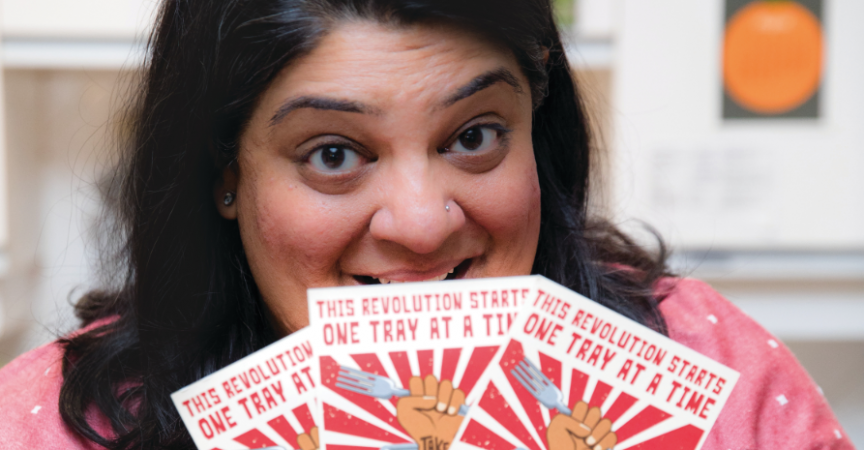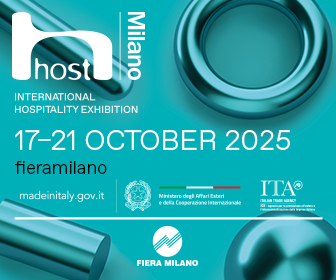Revolutionizing foodservice for institutions
Joshna Maharaj’s love of food began in India. Moving there after university, she fell into kitchen work and along the way, a light bulb went on. “I can do this for a living.” Her interest, though, wasn’t to work in a restaurant. Her interest was how people eat when they’re not in restaurants. Why doesn’t everybody have good food on their tables?
Maharaj landed a job at The Stop Community Food Centre, which had an innovative, holistic approach to food—answering the question: what happens to a life when hunger hits? It was a perfect place to cut her teeth in an environment that most chefs don’t get to experience.
“My career has always been a leap of faith. Let’s see what happens when a chef is in a scenario they’ve never been in before. What can I do to help people increase their food security?”
From the very beginning, Maharaj’s elevated food skills led to better food quality with humble ingredients. She proved what she always thought to be true; a very simple dish, made from scratch is always healthier than elaborately processed frozen food. Helping people forge a better relationship with their food has always been the core philosophy driving her career. “I think the current state of the world has us being very dismissive of the circumstances of our food system.” Maharaj explains her thoughts on the missed opportunities for connections (people sitting around a table sharing a meal, or the delight of having a parent feed you).
“We cannot assume that this is happening in households anymore. So all of the work that I do is to entice people back into the kitchen, that it’s an opportunity for joyful feelings.” For Joshna, it’s quite simple: social action is about prioritizing dinner time. It’s not only about enough food to fill the tank, but about the ritual, the connection. It’s about the kids knowing that come six o’clock, the family comes together. On a larger scale, Maharaj’s professional mission is to revolutionize institutionalized food. The standard today is ordering food electronically the night before and then everything shows up frozen and shrink wrapped the following day.
“What I would like to see is a process that reanimates all the hands in this process. Bringing in food that is fresh from a farm, and that there is a human connection when the food is delivered. The farmer who brings in the food has a conversation with kitchen staff about the food.”
One of her favourite troubleshooting moments was at a hospital putting apples on the tray. At the time, sliced apples were typically delivered in a plastic bag. Maharaj chose to enable the delivery of fresh Ontario grown whole apples from the Niagara region straight to the patient. “For hospital patients to know that there is someone on a farm rooting for you, growing delicious food that will make you feel better, that cares about your health and diet, is major. We completely undervalue the impact of that.” That’s what Maharaj wants patients to know.
That there are farmers thinking of them and that farmers know that their food is nourishing people. That we are all part of a community. And that’s how Take Back the Tray was born.
“Take Back the Tray started as a campaign around rebuilding institutionalized food. The tray is a perfect symbol of institutionalized food. I want to impact change as much as possible and as grass roots as possible.”
Having completed three “mega overhauls,” Maharaj now has the experience and the clear vision of how she will effect change in foodservice for institutions. Her latest project, a book about Take Back the Tray, is meant to educate and inform people all around the world. Take Back the Tray is a rallying point, a nucleus for the spirit of what she’s trying to do. “I want people to remember that this is our system, and that we have both the power and responsibility to make that change.” Understanding that Take Back the Tray is an idealized notion, she firmly believes that our public institutions are a reflection of who we are, mirroring our collective values.
Maharaj has global aspirations for Take Back the Tray. If there’s a community out there that’s interested, she wants to have the ability to offer support. “The thing I want people to know, is that real, effective change is possible. That this is a good news story, and with some small changes in our system, we can create radical, positive change.”
Joshna Maharaj was the recipient of the Restaurants Canada Culinary Award at RC Show 2018. Restaurants Canada is proud to support the work of industry visionaries like Maharaj by recognizing and funding these vital projects.
If you would like to read more about the Restaurants Canada Culinary or nominate someone for the 2019 award, please visit us here: https://www.rcshow.com/awards/rc-awards-of-excellence/









